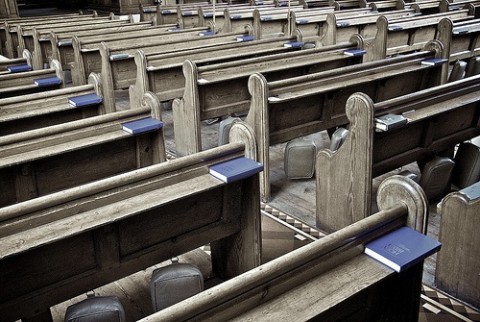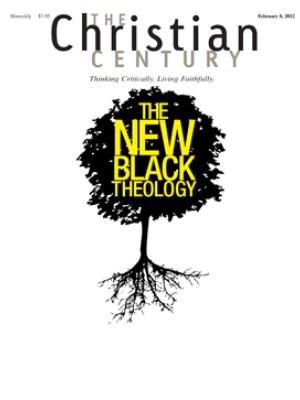No need for church: Ministry with young adults in flux
Within the metro area of Fargo, North Dakota, and Moorhead, Minnesota, are scores of vital mainline churches. So why are 45,000 young adults—close to a quarter of the entire population—not connected to any of them?
In economic terms, it's not a supply-side issue; there's simply no demand for church from the young adults. In my new call as developer of young adult ministry in the Fargo-Moorhead area, I've been meeting and talking with young adults in area pubs and coffee shops. After only a dozen conversations, it became clear that what many mainline churches here offer—the worship, the programs, the intergenerational community—fails to connect with many in their twenties and thirties. Perhaps this was predictable, but for me, a 28-year-old pastor called to work with other young adults, it's been a troubling discovery.
My faith was nourished by a historic downtown Presbyterian congregation and then pushed, prodded and deepened at a church-related college. I sensed a call to ordained ministry and attended seminary. But the more I talked with young unchurched adults, the more disconnected I felt from church as I'd known it all my life. After having ministered to me so well, the same church seems ill equipped to be church for the young people I'm meeting. In my confusion, I've decided to resort to an old pastors' trick: I listen a lot and talk very little.
Read our latest issue or browse back issues.
A young woman told me that she too had grown up in a loving Lutheran church but felt pushed out when she revealed her sexuality. She now prays regularly, attends spirituality retreats at a Catholic ministry center and volunteers in a variety of settings. But she is not connected to a congregation.
A young man described how he had hoped to be a youth pastor in his conservative evangelical denomination, but then the rigid faith he was taught at Bible college sent him into a crisis of faith. Now his questions about the Bible, and about piety and certain theological doctrines, make him feel unwelcome in the church of his youth—and uninspired to try another church.
A young woman explained that she planned to live in Fargo for only a year. She felt that it wasn't worth expending the time she'd need to get connected to a congregation but wished she had a place where she could ask faith-related questions, a place where she might grow in her love of God and neighbor.
As I began to knit together these conversations, I also began to rethink the collective mission of the Protestant congregations in Fargo-Moorhead. What I was hearing, over and over again, was not a longing to become connected to an established congregation, but a longing for a space in which nascent faith could be nurtured without judgment. I had to be honest: most congregations in town would have a hard time meeting these young adults at the appropriate place on their faith journey. Church programs, Sunday school classes, choir practices, committee meetings and potlucks are fine, but they are not compelling to someone simply looking to chat about whether God matters.
The young adults I've come to know are not antagonistic toward the church. They convey not an aversion to historic congregations but a collective indifference, a "whatever." Yes, some are looking for strong established congregations. In my experience these young adults are married, have young children, own a home, are employed and plan to stay in the area for some time. They fit the stereotype of what young adults are supposed to do in their late twenties and early thirties. I'm grateful that many congregations in town are willing and ready to welcome them with open arms.
But other emerging adults don't know their life goals. They hope to move soon, and they work three part-time jobs, all of which they hate. They live with roommates, are "freaked out" by the idea of having children and, as one young adult said, they "live in constant flux." These people don't fit in with the population of most mainline churches in town. With the questions they bring and the tattoos they wear, congregations are unsure how to attract them to their churches and, even if they are successful, what to do with them once they're inside.
Where does this leave a pastor who was formed by and loves the traditional church but who also seeks to do faithful ministry with these emerging adults? With God's stirring, I believe that together we are beginning to glimpse a new vision for ministry.
One essential aspect of this ministry is space for young people to address questions of faith, life and ethics in public settings. We've realized that our forums—and this is key—should not focus on delivering an "expert answer" from some theologically trained stranger. Instead, they must allow participants to listen to one another, to form friendships and to relax in the beauty of holy conversation.
Some have said that for young adults "conversation is authority." We trust, in these carefully designed spaces of dialogue, that the Spirit is at work as we take up Wendell Berry's invitation to "Be like the fox / who makes more tracks than necessary, / some in the wrong direction."
As a pastor I still struggle to adapt. Take the biweekly Theology Pub session that we host in the basement of a restaurant. In seminary, I dutifully learned the orthodox theology of my denomination. But among young adults at Theology Pub, my claim that "John Calvin says this . . ." would be as verboten as requiring Lutheran pastors to preach works righteousness. In this space, I've found it necessary—and ultimately rewarding—to be open and honest with my questions, to always be a partner in the conversation and to avoid being someone who is grasping for authority. I host Theology Pub, but I'm a sheep, not the shepherd. Most congregations would not allow me to be in this new role; my group requires it.
I've also grappled with the common refrain I hear when I ask emerging adults about worship: they don't like it, or at least they don't like what they imagine when they hear the word worship. The dozens with whom I've spoken simply choose not to attend.
Again, this barrier between young adults and congregations disturbs me. After all, I serve on the Presbyterian Committee on Congregational Song and am engaged in helping develop my denomination's next hymnal. Given my experiences in my new call, however, I've had to reflect on worship's "insider" nature and consider how to create worship opportunities that are welcoming to "outsiders" by being more open and unassuming. I'm ready to embrace alterative ways to pray and to praise the Lord. As one example, I'm curating an evening worship experience that includes interactive prayer stations, conversation about a scripture passage and celebration of the Lord's Supper, even as I offer thanks for the church organs that sound Sunday morning all over town.
In my view, what we're creating here is not church in the traditional sense of the word, but a ministry of the church. Just as many congregations support demographic-based ministries like campus ministry, homeless ministry and addiction ministry, so we now need to support ministry to emerging adults. Some sociologists say such young adults are in an "extended adolescence" that lasts past the college years. Whether we agree or disagree with these findings, we know that most young adults in our communities are not in our churches. If we really want to reach them, those of us in traditional congregations will have to support a ministry that focuses on them.
It won't be easy. I know how to give three-point sermons and visit shut-ins, but a new ministry with emerging adults requires a creative knack that I may not have. (I know that God loves organ music—but interactive prayer stations?) I'm grateful that when I become overwhelmed, something or someone always reminds me that I'm not called to bring God to young adults. As I listen to the stories of their lives, I sense that God is already at work. But will the church catch and claim this vision?







